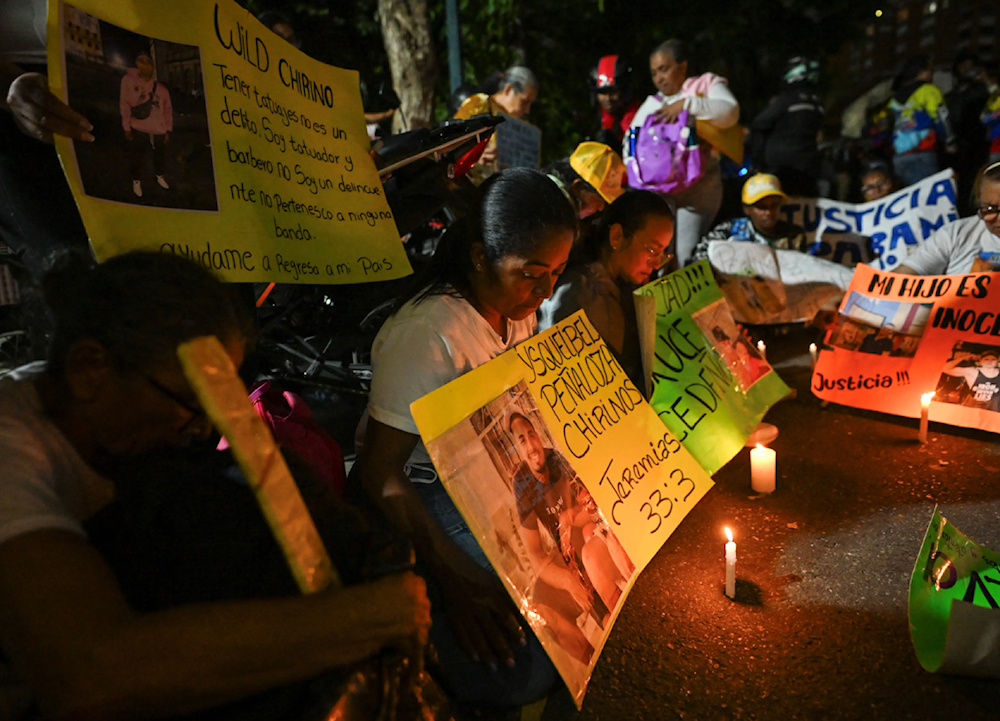US, El Salvador culprit in Venezuela deportees forced disappearance
Despite a leaked list of names, authorities from both El Salvador and the US have refused to confirm the whereabouts or provide legal justification for the detention of the deportees.
-

Relatives of Venezuelan migrants deported from the US to a maximum security prison in El Salvador attend a vigil in front of the El Salvadoran embassy in Caracas on April 2, 2025 (AFP)
The governments of the United States and El Salvador are forcing 200 Venezuelan nationals into disappearances and arbitrary detention, Human Rights Watch has revealed.
The US deported 238 Venezuelans to El Salvador in mid-March, and they were promptly sent to the massive jail Center for Confinement of Terrorism (Centro de Confinamiento del Terrorismo, CECOT), which is notorious for its harsh circumstances.
The Venezuelans have since been kept incommunicado. Although CBS News released a leaked list of names, US and Salvadoran officials have yet to provide a list of those deported. Relatives of victims who seemed to have been moved to El Salvador told Human Rights Watch that US authorities refused to give any information about their relatives' location, while Salvadoran officials were entirely unresponsive.
Human Rights Watch's Americas director, Juanita Goebertus, called the circumstances a "grave violation of international human rights law," underlining how "the cruelty of the US and Salvadoran governments has put these people outside the protection of the law and caused immense pain to their families."
The Venezuelans deported to El Salvador should be identified officially by US authorities, HRW urged. The Salvadoran government should clarify their present whereabouts, provide the legal grounds for their arrest, and enable them to communicate with the outside world.
HRW further revealed that the organization met with 40 families of those who appear to have been taken to El Salvador. On April 5, HRW wrote to Salvadoran authorities, requesting information about the identities of those held, their circumstances at CECOT, and the legal basis for their detentions. The Salvadoran government has not replied.
All family members questioned stated that US immigration authorities first informed their relatives in immigration custody that they would be deported to Venezuela. According to the family, none of them was warned that they would be sent to El Salvador.
On March 17, US authorities announced the deportation of 238 Venezuelans to El Salvador, but neither country provided a full list of detainees or the legal grounds for their detention, while the White House clarified that 137 were deported under the Alien Enemies Act and 101 under regular immigration procedures.
Last week, the US Supreme Court ruled that the Trump administration can proceed with deportations under the Alien Enemies Act (AEA). The Court's 5-4 decision overturned a previous ruling by a Washington, DC, District Court judge, who had temporarily blocked the federal government from deporting hundreds of people, alleged to be members of the Venezuelan Tren de Aragua gang, to El Salvador without a court hearing.
ICE has an Online Detainee Locator System (ODLS), which attorneys and family may use to discover those detained during immigration proceedings, but HRW found that some Venezuelan deportees were removed from the system earlier than usual, and when relatives inquired, they were told their family members' whereabouts were unknown or that they had been removed without being informed of their destination.
On March 20, CBS News published an internal US government list of people sent to El Salvador, which Human Rights Watch confirmed included the names of those it documented, though neither government has verified the list's authenticity. Relatives of detainees reported difficulties navigating El Salvador's legal system and received little response from authorities, with one Salvadoran lawyer claiming he had not been allowed to meet with his clients.
Some interviewed family members stated that they think their family members are in El Salvador based on strong pieces of information they had assembled. Some people recognized the features or parts of their relatives' bodies in a video released by Salvadoran police. Others noticed that their family members' identities were deleted from ICE's location database on or around March 16 or that their relative's name appeared on the CBS News list.
The Salvadoran administration has provided no legal justification for keeping Venezuelan deportees and has not indicated when, if ever, they would be freed from custody. HRW stated that their incarceration looks to be completely arbitrary and potentially indefinite, constituting a grave breach of El Salvador's human rights duties.
Under international law, an enforced disappearance occurs when authorities deprive someone of their liberty and then refuse to reveal their fate or location.
This breach is extremely dangerous since it removes persons from the protection of the law, making future abuses more likely.
“Nobody should be forced to piece together bits of information from the media or to read into the authorities’ silence to find out where their relatives are being held,” Goebertus expressed.
“Salvadoran authorities should urgently disclose the names and locations of all detainees transferred from the US, and allow them to contact their families.”

 5 Min Read
5 Min Read









